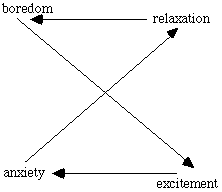Reversal Theory
by Peter Shepherd
Earlier, we looked at how a person tends to switch between paratelic and telic points of view, e.g. to reverse from experiencing excitement to a goal-directed viewpoint of anxiety, due to a contingency; an attempt would then be made to resolve this problem so as to reduce arousal towards the more pleasant telic state of relaxation.
Alternatively a reversal may occur after an extended period of relaxation to a less pleasant paratelic boredom state; an attempt would then be made to increase arousal and move into the more pleasant paratelic state of excitement.
Each of these movements is a necessary component of the learning process. The paratelic state, by its open-ended and exploratory nature expands the behavioural repertoire. In the telic state the effectiveness of acquired skills is tested and modified during attempts to recover from anxiety-evoking emergencies. Growth occurs in small steps, and each step ahead is made possible by a telic feeling of security, a point of reference to rest before the next bout of paratelic activity.

This is clearly visible in the behaviour of young children. A child who is entering a new environment with its mother will characteristically first cling to its mother's knee (in a telic bid for security) while exploring the room with its eyes. After a while it will move away a little, checking its mother's presence constantly, until finally the excursions extend much further away, with physical or eye contact between mother and child being re-established only in between the explorations (which are now being undertaken in a paratelic state). In this way a child may explore a dangerous and unknown world. If the mother suddenly disappears however, the child will grow timid and lose interest in its reconnaissance of the world, being interested merely in getting back to the security of mother, and even perhaps losing command of already acquired skills - thus crawling instead of walking, for example.
If insufficient time and relaxation is attained after a harsh experience in such a way as to be able to 'digest' the experience, or if there is insufficient skill available to resolve the situation after having encountered trouble, it will not be possible to complete the above integrating sequence and resume paratelic activity. Instead a compulsive (because there is no choice) fixation of the avoidance-reaction (i.e. the first-line emergency reflex) will occur. Increased rigidity and stereotyped behaviour will result with a lower general level of skill. If the situation is traumatic, long lasting or regularly repeated, a neurosis may be imprinted: a behavioural pattern that reactivates when restimulated in similar situations.
The more situations that have been experienced, re-experienced and subsequently digested and mastered, thus becoming familiar and reassuring, the easier it is to attain relaxation in any problematic situation inducing the telic state (anxiety), and particularly if those experiences and skills bear some relevance to the problem. New skills, coping and mastery are therefore more likely to develop in areas of experience which are in some way related to other, already properly integrated and mastered, areas of experience. Training, with repetitive practice towards high proficiency under stress, in skills that have wide general application, is therefore valuable, especially in a properly sequenced development programme.
Move on to COEX Systems.
Return to Transforming the Mind - Contents.